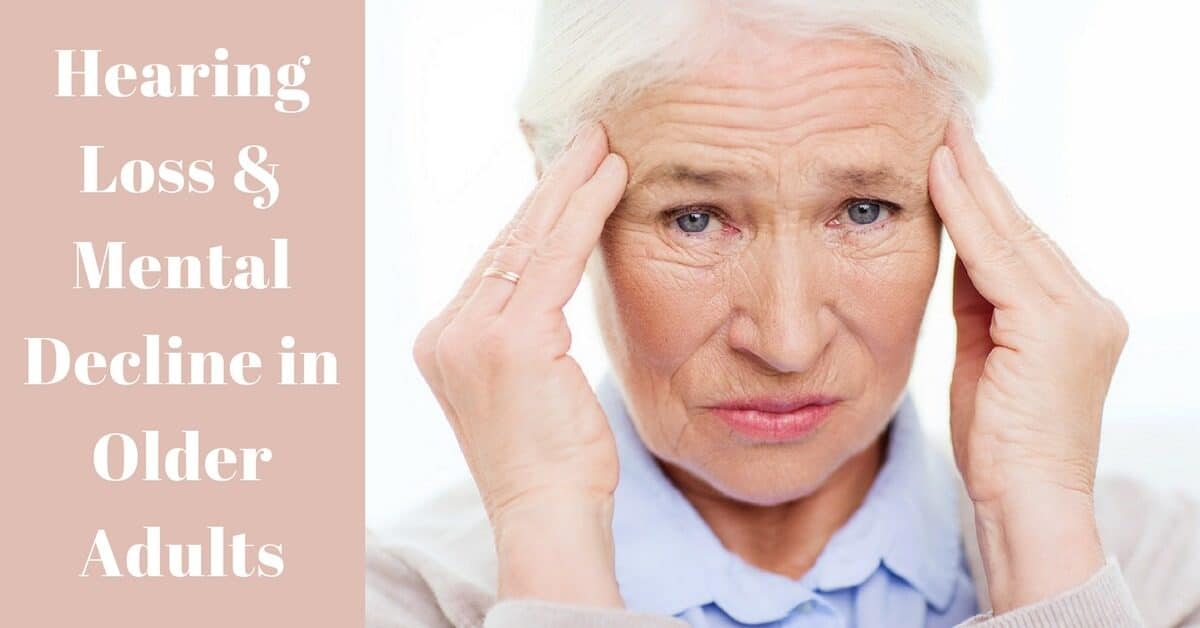If you’re retired, or have an aging parent, you’ve probably read a lot of articles about mental decline, and what to expect as you reach your 80s. Have you also done your research on hearing loss? Hearing deteriorates as you get older, and if you’re over 65 there’s a one in three chance you already have hearing loss. If you’re over 75, that jumps to 50%! Since mental decline and hearing loss are two common conditions that affect the aging population, it’s not surprising that several studies show clear links between hearing loss and rates of mental decline.
Living with Untreated Hearing Loss
For seniors with hearing loss, daily life can be a struggle. From missing a phone call from your daughter in the morning, to burning the cookies in the oven since you didn’t hear the alarm, living with hearing loss is no cake walk. It’s difficult to follow conversations or engage with loved ones like you’d like to. And forget going out the a restaurant for dinner! It’s impossible to understand what’s being said around you, you have difficulty following along or answering questions, and with the background noise, multiple conversations, and that waiter who keeps appearing out of nowhere to ask you more questions, dining out is just one of many frustrating experiences for those with hearing loss.
Hearing Loss and Social Isolation
Those living with untreated hearing loss are more likely to face nervousness and anxiety when faced with social situations. It’s common for those living with untreated hearing loss to socially isolate themselves. As their ability to communicate deteriorates, so does their desire to interact with friends and even loved ones. They might feel embarrassed that they don’t understand what’s being said to them, and afraid they’ll answer inappropriately. It’s not uncommon for those living with untreated hearing loss to isolate themselves, stay home from social gatherings and spend more and more time alone. They’re also more likely to suffer from depression or other mental health concerns.
Hearing Loss and Mental Decline
According to a recent study, older adults with hearing loss quickly develop problems with memory, concentration, and logical thinking. Frank Lin, otologist and epidemiologist at the Johns Hopkins University School of Medicine in Baltimore found that those with hearing loss had extremely rapid rates of mental decline, 30% to 40% faster than those with normal hearing! Lin’s team also discovered that for those with profound hearing loss, rates of cognitive decline were even faster.
One explanation for this link between hearing loss and cognitive decline is social isolation. If you have hearing loss, you know the anxiety you face meeting people, and have often given in to the temptation to stay home and poke around the garden instead of going out for dinner for your friend’s birthday celebration. When you’re not getting out of the house as often and don’t have much social interaction, it’s not surprising that you get less mental stimulation. With no one to talk to and nothing to do except stare at the TV, your brain doesn’t get any exercise, and soon gets even worse at following conversations, turning this into a vicious cycle. Seniors living with untreated hearing loss face sudden cognitive decline, as well as higher rates of dementia.
Another factor in mental decline is that the brain works much harder just to hear sounds and translate them into meaningful words and sentences. When you’re straining to hear, your brain is working overtime, and “if the brain constantly has to expend more resources to decode sound, this may come at a cognitive cost,” explains Lin. Your brain gets overworked, and this leads to mental fatigue and decline.
Hearing Aids: The Key to a Sharp Mind
If you have hearing loss, don’t wait! The study found that seniors with hearing deficits showed significant mental decline around three years sooner than those with treated or normal hearing. Lin discovered that only 15% of those who need hearing aids actually seek treatment! Don’t be part of this statistic. Hearing aids have proven to slow mental deterioration, and keep you sharp as a tack. Visit us at the My Hearing Centers location closest to you, and let our hearing specialists help you make the best decision for your mental health and for your future.


